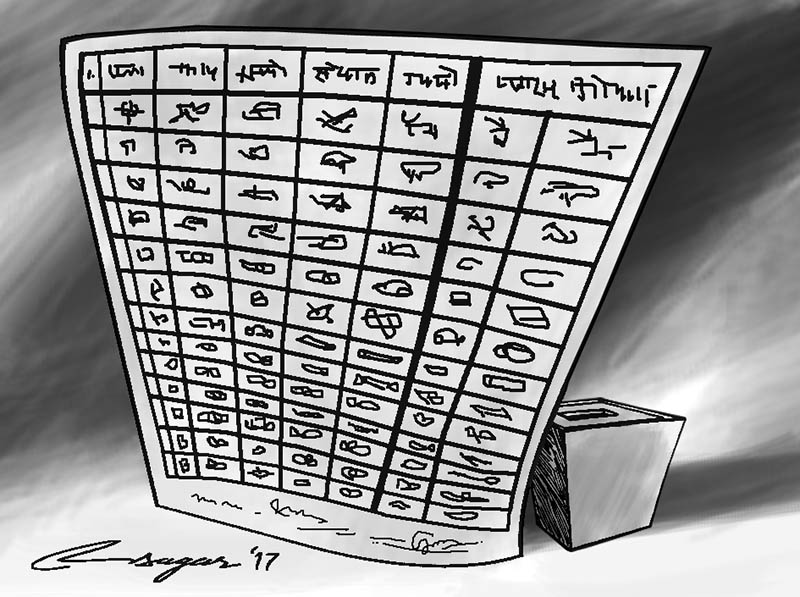Election and ballot papers: Simple solutions are possible
The best political system ensures a larger participation of citizens as contestants. For this a political system must accommodate two most simplest expressions to ensure that
A country owns respect when it demonstrates excellence in at least a few common things like policy, governance and service delivery. Excellence in delivery mechanism is a feature of a prosperous country.
Lessons were learnt from the 14th May, 2017 election. If a nation gets a situation where people can’t read and count comfortably due to the size and entries of a ballot paper, it’s time to go back to the basics.
New South Wales upper house election in 1999 witnessed a ballot paper stretching to one meter length and 700 mm deep to accommodate a total of 264 contestants. What if a large number of people decide to contest and the ballot papers reach a huge size and accommodation compels reading possible only through magnifying glasses?
Right to contest is unquestionable, so without elimination rounds, ballot papers based on electoral system does not seem to have better efficiency. Electronic voting will prove to be yet another trap, election hacking and interference in the recent US presidential poll are definitely not a good sign. The world community now admits that focused cyber operations against elections are the newest threats experienced by both developed and developing countries – almost as a global phenomenon.
High numbers of contestants are a recent trend all over the world, especially in the parts where people are unhappy. Individual strength was the basis for leadership selection in early times. Gradually speed, stamina, skill and sharpness were added to it. Later, leadership gradually shifted from individual level to group level. Now, the group that exercises the power like muscle, money, machinery, media and intelligence has completely crippled the elections.
Copy paste is not bad, but with one’s own ground reality it must be adjusted to yield excellence. The term democracy with its root deeply grounded in the human slavery has “demos for common people” and “kratos for strength” from its ancient Greek origin. It first appeared in ancient Greek political and philosophical thought and later got established in Athens in 508–507 BC.
Since then, series of changes through active/passive right to vote (suffrage), women suffrage, universal suffrage, adult franchise and so on got introduced to refine it further and further. However, democracy still has not attained its highest possible goal, and lacks fairness and excellence issues.
A country can learn many nice lessons from its own history and culture. Selection of a king by Ligligkot marathon and elephant garlanding of King Nawaraj in Swasthani Katha may not be relevant now, but see the beauty in such practices. Not yet realized, the best political system is the one where election is made like a festival and genuine citizens are entitled and encouraged to contest with only the best two or three stages for final voting. This will not be possible without elimination rounds - “a must criterion” for filtering.
Good governance does not require knowledge of rocket science, but it needs people with common sense and basic level of intelligence. Nepal has enough political experiences and no need of further experiments. The CVs of past and current political leaders are full of inspiration, but lack delivery. So where is the problem?
Over 99% of the people belong to the service sector, from labor to business industries and now political parties, but the genuinely needed people in policy making and governance are rare. Dust and plastics are available everywhere, but gems are hidden treasures. The filtering system is needed to bring out and identify these rare gems. Otherwise, TOEFL and GRE will hunt them and countries like Nepal will be left out with just residuals.
The best political system ensures a larger participation of citizens as contestants. For this a political system must accommodate two most simplest expressions to ensure that. A beggar and a king will never be comparable unless a few specific grounds are designed.
Honesty can be such a ground where these two can be equal. Similarly, you can’t add two things to progress if they are opposite in nature. Understanding these two expressions in its entirety, Nepal could have constituted the world’s shortest Constitution, only after Great Britain.
See the natural systems around us where everything gets filtered from food to fabrics, ensuring quality. Contestants whether from political parties or independents are just like “market products” at the launching pad before quality control.
With simple kid games these issues of democracy can be fixed. A mandatory win of a certain level of “randomly selected computer based chess game” can be one of such option. Similarly, time based “LigLigKot Cube Marathon” can be another interesting option for such a gem hunt.
One can easily test these ideas with themselves. More interestingly, just select 10 best brains of the country each from sectors like politics, bureaucracy, judiciary, security and intelligence, media, business, social sector, education, medicine, engineering and so on and see how many of them are competent enough in these simple games.
Nepal currently needs intelligent people and not intellectuals in its policy making and governance. Some time big problems have very simple solutions.
Pokharel is an energy expert






